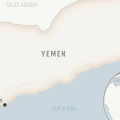Yemen’s Al-Qaeda branch reports leader Khalid Al-Batarfi’s unclear death

The recent announcement of Khalid Al-Batarfi’s death, the leader of Al-Qaeda in Yemen, reverberated through global security circles. Al-Batarfi, who had been targeted with a $5 million bounty by the U.S. government, passed away under mysterious circumstances, with the details surrounding his demise left undisclosed. The timing of the announcement, on the eve of Ramadan, added a layer of significance to the event, resonating within both the militant group’s followers and the broader Muslim community.
Leadership Succession
With Al-Batarfi’s demise, the spotlight now turns to the succession within the ranks of Al-Qaeda in Yemen. Saad bin Atef al-Awlaki emerges as the appointed successor, stepping into the shoes of his predecessor amidst the backdrop of heightened scrutiny and relentless pursuit by international counterterrorism efforts. Al-Awlaki’s ascension to leadership comes with its own set of challenges, compounded by the $6 million bounty placed on him by the U.S. government, reflective of his history of advocating attacks against the United States and its allies.
Al-Qaeda’s Ongoing Threat
Despite the setbacks and internal strife faced by Al-Qaeda in Yemen, the group remains a potent threat, as underscored by a recent United Nations report. Responsible for high-profile attacks such as the 2009 attempt to bomb a U.S. airliner and the 2015 Charlie Hebdo massacre in Paris, Al-Qaeda in Yemen maintains an estimated force of 3,000 to 4,000 fighters. This resilience highlights the enduring nature of the organization and its capacity to adapt to evolving security landscapes, posing a continued challenge to global security efforts.
Complex Dynamics and Regional Influence
The dynamics within Al-Qaeda in Yemen are intricately intertwined with broader regional alliances and conflicts. Under al-Batarfi’s leadership, the group forged alliances with key figures like Saif al-Adl, potentially leveraging connections in Iran.
Furthermore, AQAP’s acquisition of bomb-carrying drones, possibly with Houthi assistance, underscores the complex geopolitical landscape of Yemen.
Keep Reading
This interplay of regional actors and shifting alliances adds layers of complexity to counterterrorism efforts, requiring a nuanced approach to address the multifaceted threats emanating from the region.
The demise of Khalid al-Batarfi marks a significant development in the ongoing saga of Al-Qaeda in Yemen. As the group navigates the challenges of succession and adapts to shifting regional dynamics, the broader implications for global security remain profound.
With Al-Qaeda’s enduring threat underscored by recent developments, the need for coordinated international efforts to combat terrorism has never been more pressing








